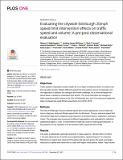Evaluating the citywide Edinburgh 20mph speed limit intervention effects on traffic speed and volume : a pre-post observational evaluation
Abstract
Objectives: Traffic speed is important to public health as it is a major contributory factor to collision risk and casualty severity. 20mph (32km/h) speed limit interventions are an increasingly common approach to address this transport and health challenge, but a more developed evidence base is needed to understand their effects. This study describes the changes in traffic speed and traffic volume in the City of Edinburgh, pre- and 12 months post-implementation of phased city-wide 20mph speed limits from 2016-2018. Methods: The City of Edinburgh Council collected speed and volume data across one full week (24 hours a day) pre- and post-20mph speed limits for 66 streets. The pre- and post-speed limit intervention data were compared using measures of central tendency, dispersion, and basic t-tests. The changes were assessed at different aggregations and evaluated for statistical significance (alpha = 0.05). A mixed effects model was used to model speed reduction, in the presence of key variables such as baseline traffic speed and time of day. Results: City-wide, a statistically significant reduction in mean speed of 1.34mph (95% CI 0.95 to 1.72) was observed at 12 months post-implementation, representing a 5.7% reduction. Reductions in speed were observed throughout the day and across the week, and larger reductions in speed were observed on roads with higher initial speeds. Mean 7-day volume of traffic was found to be lower by 86 vehicles (95% CI: -112 to 286) representing a reduction of 2.4% across the city of Edinburgh (p=0.39) but with the direction of effect uncertain. Conclusions: The implementation of the city-wide 20mph speed limit intervention was associated with meaningful reductions in traffic speeds but not volume. The reduction observed in road traffic speed may act as a mechanism to lessen the frequency and severity of collisions and casualties, increase road safety, and improve liveability.
Citation
Nightingale , G , Williams , A J , Hunter , R , Woodcock , J , Turner , K , Cleland , C , Baker , G , Kelly , M , Cope , A , Kee , F , Milton , K , Foster , C , Jepson , R & Kelly , P 2021 , ' Evaluating the citywide Edinburgh 20mph speed limit intervention effects on traffic speed and volume : a pre-post observational evaluation ' , PLoS ONE , vol. 16 , no. 12 , e0261383 . https://doi.org/10.1371/journal.pone.0261383
Publication
PLoS ONE
Status
Peer reviewed
ISSN
1932-6203Type
Journal article
Description
Funding: The ‘Is 20 plenty for health?’ project is funded by a National Institute for Health Research (NIHR) Public Health Research (PHR) grant 15/82/12.Collections
Items in the St Andrews Research Repository are protected by copyright, with all rights reserved, unless otherwise indicated.

